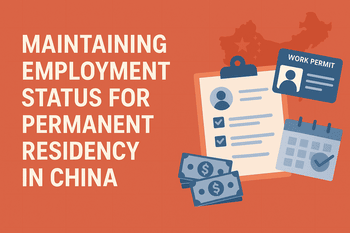
Securing and maintaining permanent residency in China hinges significantly on your employment status.
Whether you’re a high-level executive, a tech specialist, or an investor, sustaining valid work authorization and meeting income thresholds directly affects your eligibility and the renewal of your “Chinese Green Card.”
This guide explores the essential employment requirements, compliance tips, and practical strategies to safeguard your path to permanent residency in China.
Why Employment Status Matters
China’s permanent residency framework prioritizes foreign nationals who make substantial economic, technological, or cultural contributions.
The Measures for the Administration of Examination and Approval of Foreigners’ Permanent Residence in China list several categories—among them, those holding senior roles in Chinese enterprises or demonstrating stable, high-value tax records.
Key reasons employment status is vital:
- Proof of Financial Stability: A valid work permit and regular salary show you can support yourself without social aid.
- Tax Compliance: Consistent individual income tax payments reinforce China’s emphasis on tax contribution over multiple consecutive years.
- Policy Alignment: Talent-driven initiatives (e.g., Zhongguancun high-end talent) require active employment with specific annotations on your residence permit.
Employment Requirements for Permanent Residency
Different tracks for permanent residency have distinct employment thresholds.
Below is a concise comparison of common employment-based criteria:
| Category | Position / Role | Minimum Tenure | Tax & Salary Requirements |
|---|---|---|---|
| Senior Enterprise Professionals | Deputy General Manager or above | 4 consecutive years in China | Equivalent salary ≥ professional associate level; taxes paid fully each year |
| Foreign Talents with ‘Talent’ Mark | Work permit carrying “Talent” annotation | Varies by municipality (e.g., Beijing) | Annual salary & tax paid meet local criteria |
| Investors & Major Contributors | Personal investment ≥ USD 2 million | 3 years of residency (9 months/year) | Good tax record for 3 continuous years |
| Family Reunification (Spouse Route) | Spouse of PR holder or Chinese citizen | Married ≥ 5 years, 5 years consecutive residence (9 months/year) | Stable income & housing proof |
Sources: National Immigration Administration; Beijing Municipal Public Security Bureau
Maintaining these employment conditions not only strengthens your PR application but also ensures smooth renewals of your D-class visas and residence permits.
Tips for Sustaining Your Employment Status
1. Timely Visa & Permit Renewals
- Apply for your work visa (Z visa) extension at least 30 days before expiry.
- Convert Z visa to a residence permit within 30 days of entry into China.
2. Consistent Tax Filings
- Use authorized tax consultants or in-house HR to file monthly income tax.
- Keep records of social insurance payments; some provinces require social contributions for PR eligibility.
3. Employer Compliance
- Ensure your employer holds a valid Foreign Expert or Talent License.
- Ask HR to update your work permit promptly after any role or salary change.
4. Residency Requirements
- Live at your registered address (domicile) for at least nine months per year.
- If traveling abroad, limit absences to fewer than 90 days in a single trip for PR renewal considerations.
Changing Jobs Without Jeopardizing PR
Switching employers can be a minefield if not handled correctly.
Follow these steps to safeguard your status:
1. Apply for Work Permit Transfer
- Submit a “Notification of Foreign Expert Qualification” transfer through the municipal human resources bureau.
- Your new employer initiates a permit change before terminating your existing permit.
2. Bridge the Gap
- Avoid a period without a valid work permit. If necessary, apply for a short-term stay visa (S1) during the transition.
3. Update Residence Permit
- Within 15 days of permit endorsement, register your new address at the local Public Security Bureau (PSB) Exit-Entry Administration.
4. Notify Immigration Authorities
- Submit a change-of-employer report to the PSB within 10 working days of permit approval.
Consequences of Losing Employment Status
Failure to maintain valid work authorization jeopardizes both your current residence permit and long-term PR prospects:
- Residence Permit Invalidity: Without a valid work permit, your Z-class residence permit becomes void, necessitating exit from China.
- PR Application Rejection: New PR applicants must demonstrate stable employment and tax compliance; gaps can lead to outright rejection.
- PR Cancellation: Applicants already granted PR may face card cancellation under Article 24 of the Measures if they violate stay conditions (e.g., overstaying without permit).
FAQ: Common Queries
Q: How long can I stay outside China without affecting my PR eligibility?
A: For permanent resident permit renewals, maintain no more than 90 consecutive days abroad and under nine months total per year.
Q: Does self-employment qualify?
A: Running a registered business with annual revenue and tax payments meeting local thresholds can satisfy the investment route.
Q: Can I renew PR after losing my job?
A: You must restore valid work authorization promptly. Extended unemployment with no new work permit risks permit invalidity and delays renewal.
Useful Resources
- National Immigration Administration (NIA) – Guidelines for Permanent Residency
https://en.nia.gov.cn/n147423/n147478/n147715/c158291/content.html - Beijing Municipal Public Security Bureau – PR Application Conditions
https://english.beijing.gov.cn/livinginbeijing/permanentresidence/index.html - China Legal Experts – Permanent Residence in China Application: Requirements & Process
https://www.chinalegalexperts.com/news/permanent-residence-in-china
Conclusion
Navigating China’s permanent residency landscape demands more than one successful application—it requires ongoing compliance with employment, tax, and residency rules.
By proactively managing visa renewals, tax filings, and employer transitions, you safeguard not only your current work authorization but also your long-term goal of holding a Chinese Green Card.
Stay informed, plan ahead, and lean on professional advisors or HR experts to keep your journey on track.



